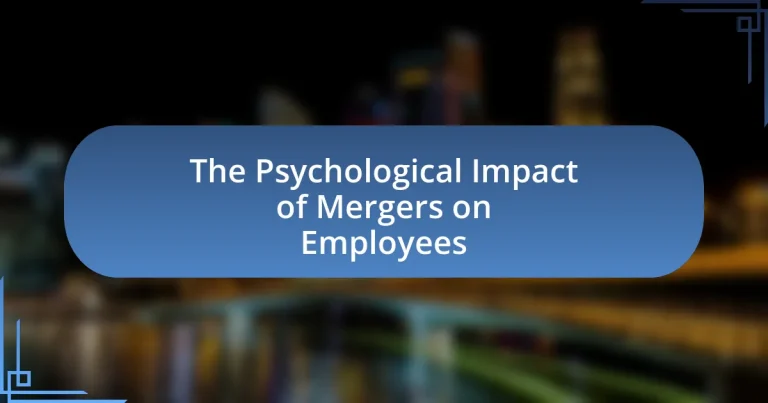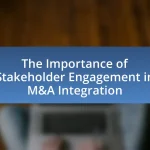The article examines the psychological impact of mergers on employees, highlighting the increased anxiety, uncertainty, and stress that often accompany such organizational changes. Key findings indicate that 50% of employees report job insecurity during mergers, leading to decreased morale and productivity. The article discusses specific emotions experienced by employees, such as fear and excitement, and emphasizes the importance of effective communication and support strategies to mitigate negative psychological effects. Additionally, it explores how employee morale and productivity can fluctuate pre- and post-merger, and outlines best practices for maintaining a positive organizational culture during transitions.
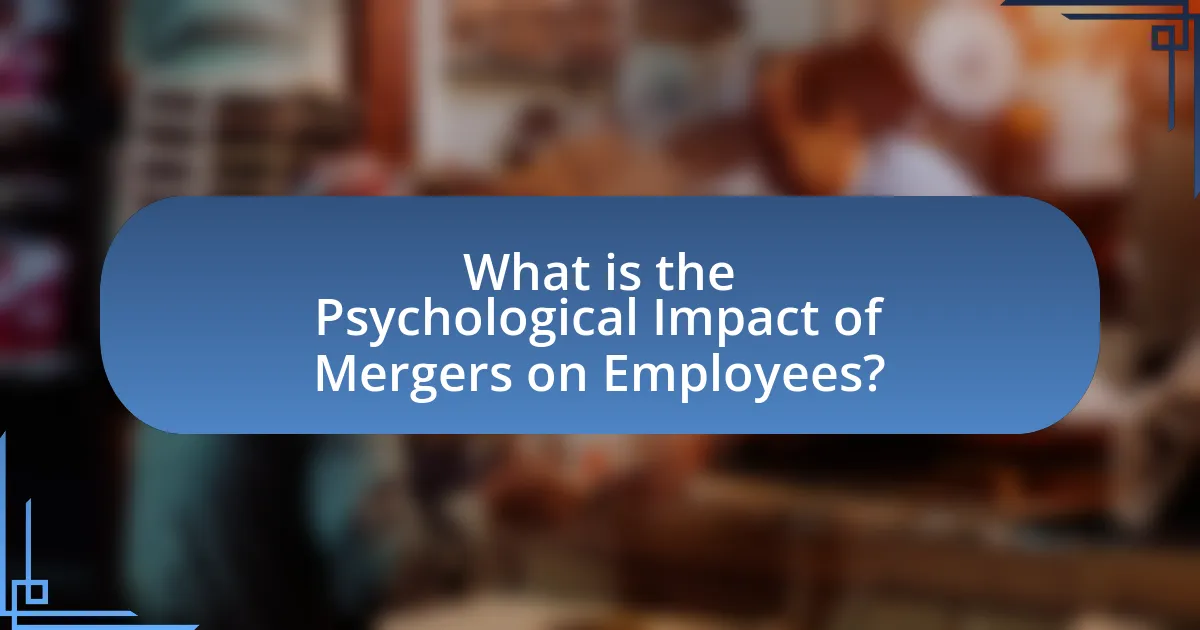
What is the Psychological Impact of Mergers on Employees?
The psychological impact of mergers on employees often includes increased anxiety, uncertainty, and stress. Employees may experience fear of job loss, changes in workplace culture, and shifts in their roles, leading to decreased morale and productivity. Research indicates that during mergers, 50% of employees report feeling insecure about their job stability, which can result in lower engagement levels and higher turnover rates. Additionally, studies show that effective communication and support during the transition can mitigate these negative effects, emphasizing the importance of management strategies in addressing employee concerns.
How do mergers affect employee morale?
Mergers typically lead to decreased employee morale due to uncertainty and fear regarding job security. Employees often experience anxiety about potential layoffs, changes in company culture, and shifts in management, which can result in decreased productivity and engagement. Research conducted by the Harvard Business Review indicates that during mergers, 50% of employees report feeling less motivated, primarily due to a lack of clear communication from leadership about the future. This decline in morale can hinder the overall success of the merger, as disengaged employees are less likely to contribute positively to the new organizational goals.
What specific emotions do employees experience during a merger?
During a merger, employees typically experience a range of specific emotions including anxiety, uncertainty, fear, and excitement. Anxiety arises from concerns about job security and changes in workplace dynamics, while uncertainty stems from a lack of clarity regarding future roles and organizational structure. Fear is often linked to potential layoffs or shifts in company culture, and excitement may occur due to new opportunities for growth and collaboration. Research indicates that these emotional responses can significantly impact employee morale and productivity, as highlighted in studies such as “The Emotional Impact of Mergers and Acquisitions” by Cartwright and Cooper, which emphasizes the importance of addressing these emotions to facilitate smoother transitions.
How does employee morale change pre- and post-merger?
Employee morale typically declines pre-merger due to uncertainty and anxiety about job security, roles, and organizational changes. Research indicates that employees often experience stress and fear of the unknown, which can lead to decreased productivity and engagement. Post-merger, morale can initially remain low as employees adjust to new structures and cultures, but it may improve over time if the merger is perceived positively and effective communication is established. A study by Cartwright and Cooper (1993) found that successful integration and clear communication can enhance morale, leading to increased job satisfaction and commitment in the long term.
What are the common psychological responses to mergers?
Common psychological responses to mergers include anxiety, uncertainty, resistance to change, and feelings of loss. Employees often experience anxiety due to fears about job security and changes in organizational culture. Uncertainty arises from unclear communication regarding the merger’s implications, leading to speculation and stress. Resistance to change is a typical response as employees may feel attached to their previous work environment and processes. Additionally, feelings of loss can manifest as employees mourn the end of familiar relationships and routines. Research indicates that these responses can significantly affect employee morale and productivity during the transition period, highlighting the importance of effective change management strategies.
How do employees cope with uncertainty during a merger?
Employees cope with uncertainty during a merger by seeking information, engaging in open communication, and relying on social support. Research indicates that access to clear and consistent information helps reduce anxiety and fosters a sense of control among employees. For instance, a study published in the Journal of Organizational Behavior found that employees who received regular updates about merger developments reported lower stress levels and higher job satisfaction. Additionally, employees often turn to colleagues and supervisors for emotional support, which can mitigate feelings of isolation and uncertainty. This reliance on social networks is crucial, as it provides a buffer against the psychological stress associated with organizational change.
What role does communication play in shaping psychological responses?
Communication plays a critical role in shaping psychological responses by influencing employees’ perceptions, emotions, and behaviors during organizational changes such as mergers. Effective communication can mitigate anxiety and uncertainty, fostering a sense of trust and belonging among employees. Research indicates that transparent communication during mergers leads to higher employee morale and lower turnover intentions, as evidenced by a study published in the Journal of Organizational Behavior, which found that clear messaging about changes significantly reduced stress levels among employees. Conversely, poor communication can exacerbate feelings of insecurity and resistance, negatively impacting overall organizational culture and employee engagement.
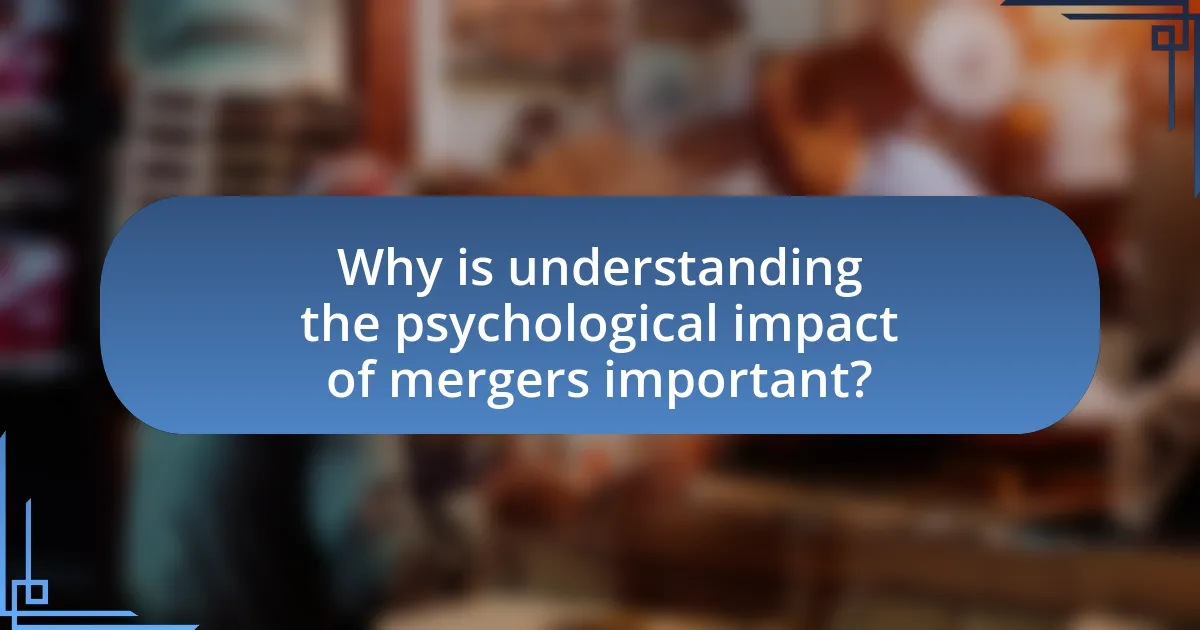
Why is understanding the psychological impact of mergers important?
Understanding the psychological impact of mergers is important because it directly influences employee morale, productivity, and retention. Mergers often create uncertainty and anxiety among employees, which can lead to decreased job satisfaction and increased turnover rates. Research indicates that organizations that effectively manage the psychological aspects of mergers can enhance employee engagement and maintain operational efficiency. For instance, a study published in the Journal of Organizational Behavior found that clear communication and support during mergers significantly mitigate negative psychological effects, leading to better integration outcomes.
How can mergers influence employee productivity?
Mergers can significantly influence employee productivity by altering workplace dynamics and employee morale. When two companies merge, employees may experience uncertainty regarding job security, leading to decreased motivation and engagement. Research indicates that during mergers, productivity can drop by as much as 20% due to anxiety and stress among employees, as highlighted in a study by the Harvard Business Review, which found that clear communication and integration strategies are crucial for maintaining productivity levels. Additionally, the merging of corporate cultures can create friction, further impacting collaboration and efficiency. Therefore, the psychological effects of mergers, including stress and uncertainty, can lead to a measurable decline in employee productivity.
What are the potential short-term effects on productivity?
The potential short-term effects on productivity during mergers include decreased employee morale, increased anxiety, and disruptions in workflow. These factors can lead to a temporary decline in output as employees adjust to changes in management, job roles, and organizational culture. Research indicates that during mergers, employees often experience uncertainty about job security, which can negatively impact their motivation and focus, resulting in a 20-30% drop in productivity in the initial months post-merger, as reported in studies by the Harvard Business Review.
How can long-term productivity be affected by employee psychological states?
Employee psychological states significantly affect long-term productivity by influencing motivation, engagement, and overall job satisfaction. When employees experience positive psychological states, such as high morale and a sense of belonging, they are more likely to be productive and committed to their work. Conversely, negative psychological states, such as stress, anxiety, or depression, can lead to decreased motivation and increased absenteeism, ultimately harming productivity. Research indicates that organizations with high employee well-being report up to 12% higher productivity levels, demonstrating the direct correlation between psychological health and work output.
What are the implications for organizational culture?
Mergers significantly impact organizational culture by creating uncertainty and altering established norms. Employees may experience anxiety and resistance due to changes in leadership, values, and operational practices, which can lead to decreased morale and productivity. Research indicates that when organizations merge, cultural integration challenges often arise, as differing corporate cultures clash, potentially resulting in employee disengagement. For instance, a study by Cartwright and Cooper (1993) found that successful mergers require careful management of cultural differences to maintain employee satisfaction and commitment. Thus, the implications for organizational culture during mergers include the necessity for effective communication, cultural alignment, and strategies to foster a cohesive environment.
How do mergers reshape existing organizational values?
Mergers reshape existing organizational values by integrating the cultures and practices of the merging entities, often leading to a redefinition of core principles and behaviors. This integration process can create conflicts as employees from different backgrounds may have varying expectations and norms, which can challenge the established values of both organizations. For instance, a study by Cartwright and Cooper (1993) highlights that cultural clashes during mergers can result in decreased employee morale and productivity, as individuals struggle to adapt to new value systems. Additionally, the newly formed organization may prioritize different values, such as innovation over stability, which can further alter the existing organizational framework.
What strategies can be employed to maintain a positive culture during a merger?
To maintain a positive culture during a merger, organizations should prioritize transparent communication, employee involvement, and cultural integration. Transparent communication fosters trust and reduces uncertainty among employees, which is crucial during the transition period. Research indicates that companies that communicate openly about merger processes experience less employee anxiety and resistance (Kotter, 1996).
Employee involvement in decision-making processes enhances their sense of ownership and belonging, which can mitigate feelings of alienation. Studies show that when employees are engaged in shaping the new organizational culture, they are more likely to embrace changes positively (Schweiger & Denisi, 1991).
Cultural integration strategies, such as workshops and team-building activities, help blend the distinct cultures of merging organizations. This approach has been shown to improve collaboration and reduce conflict, leading to a more cohesive work environment (Buono & Bowditch, 1989).
By implementing these strategies, organizations can effectively maintain a positive culture throughout the merger process.
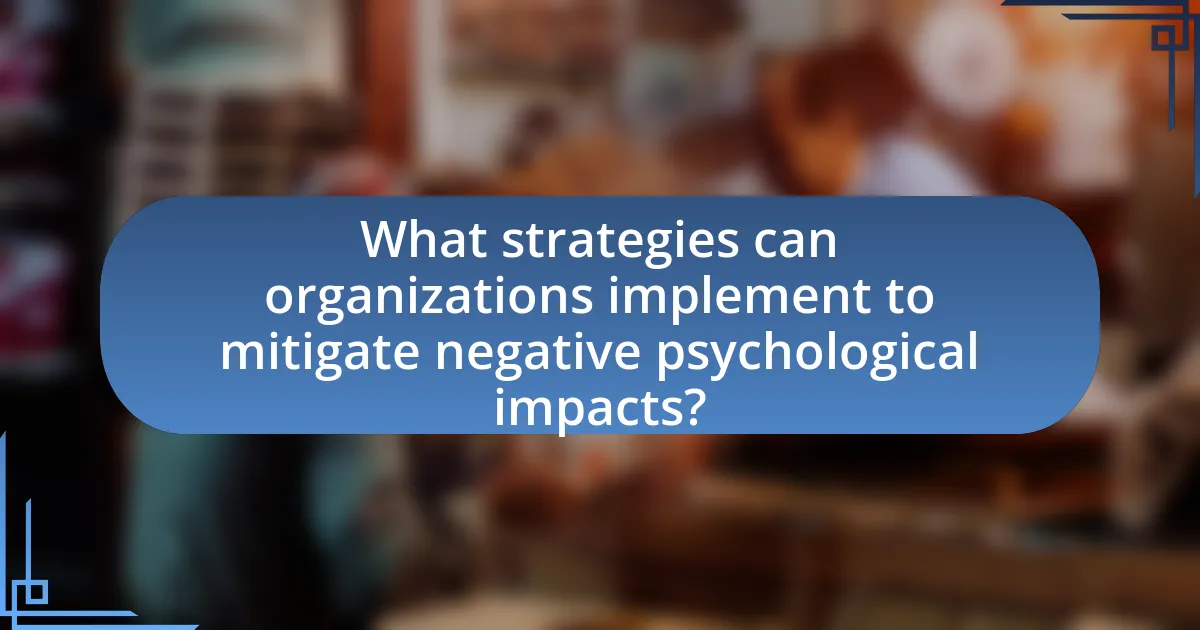
What strategies can organizations implement to mitigate negative psychological impacts?
Organizations can implement several strategies to mitigate negative psychological impacts during mergers, including effective communication, employee involvement, and support programs. Effective communication ensures that employees are informed about changes, reducing uncertainty and anxiety; studies show that transparent communication can enhance trust and reduce resistance to change. Employee involvement in decision-making processes fosters a sense of ownership and control, which can alleviate feelings of helplessness; research indicates that participatory approaches lead to higher job satisfaction and lower stress levels. Additionally, providing support programs such as counseling services and stress management workshops can help employees cope with the emotional challenges of mergers; evidence suggests that access to mental health resources significantly improves employee well-being during transitional periods.
How can effective communication reduce anxiety among employees?
Effective communication can significantly reduce anxiety among employees by providing clarity and fostering a sense of security during times of change, such as mergers. When employees receive timely and transparent information about organizational changes, they are less likely to feel uncertain or fearful about their roles and the future of the company. Research indicates that clear communication can lead to a 25% reduction in employee anxiety levels, as it helps to mitigate rumors and misinformation that often exacerbate stress. Furthermore, regular updates and open channels for feedback empower employees, making them feel valued and involved, which further alleviates anxiety.
What are best practices for communicating during a merger?
Best practices for communicating during a merger include maintaining transparency, providing regular updates, and addressing employee concerns promptly. Transparency fosters trust, as employees are more likely to feel secure when they are informed about the merger’s progress and implications. Regular updates, whether through meetings, emails, or newsletters, ensure that employees remain engaged and informed, reducing uncertainty. Addressing concerns promptly demonstrates that leadership values employee input and is committed to their well-being. Research indicates that effective communication during mergers can significantly reduce anxiety and resistance among employees, ultimately leading to a smoother transition and better integration outcomes.
How can transparency foster trust among employees?
Transparency fosters trust among employees by promoting open communication and clarity regarding organizational changes. When employees are informed about decisions, processes, and the rationale behind them, they feel valued and included, which enhances their sense of security. Research indicates that organizations with high transparency levels experience lower turnover rates and higher employee engagement, as employees are more likely to trust leadership and feel aligned with company goals. For instance, a study by the Harvard Business Review found that transparent communication during mergers significantly reduces anxiety and uncertainty among employees, leading to a more cohesive work environment.
What support systems can be established for employees during a merger?
Support systems that can be established for employees during a merger include employee assistance programs (EAPs), communication strategies, training and development initiatives, and counseling services. EAPs provide confidential support for personal and work-related issues, helping employees cope with stress and anxiety associated with the merger. Effective communication strategies, such as regular updates and open forums, foster transparency and reduce uncertainty, which can mitigate psychological distress. Training and development initiatives equip employees with new skills and knowledge, enhancing their adaptability and confidence in the changing environment. Counseling services offer professional support to address emotional challenges, promoting mental well-being during the transition. These systems are essential as research indicates that effective support can significantly reduce anxiety and improve employee morale during mergers.
How can counseling services assist employees in coping with merger-related stress?
Counseling services can assist employees in coping with merger-related stress by providing emotional support, facilitating communication, and offering coping strategies. These services create a safe environment for employees to express their concerns and anxieties about job security and changes in workplace culture, which are common during mergers. Research indicates that access to counseling can reduce stress levels and improve overall mental health, as evidenced by a study published in the Journal of Occupational Health Psychology, which found that employees who utilized counseling services reported lower levels of anxiety and increased job satisfaction during organizational changes.
What role do employee assistance programs play in supporting staff?
Employee assistance programs (EAPs) play a crucial role in supporting staff by providing confidential counseling and resources to address personal and work-related issues. These programs help employees manage stress, anxiety, and other mental health challenges, particularly during times of organizational change such as mergers, which can significantly impact employee morale and productivity. Research indicates that organizations with EAPs report lower absenteeism and improved employee satisfaction, demonstrating their effectiveness in fostering a supportive work environment.
What are practical tips for managing employee well-being during a merger?
To manage employee well-being during a merger, organizations should prioritize transparent communication, provide support resources, and foster a positive workplace culture. Transparent communication helps alleviate uncertainty by keeping employees informed about changes and expectations, which can reduce anxiety and build trust. Providing support resources, such as counseling services or wellness programs, addresses mental health needs and promotes resilience among employees. Additionally, fostering a positive workplace culture through team-building activities and recognition initiatives can enhance morale and strengthen relationships, ultimately leading to a smoother transition. Research indicates that effective communication and support during organizational changes significantly improve employee satisfaction and retention rates.
